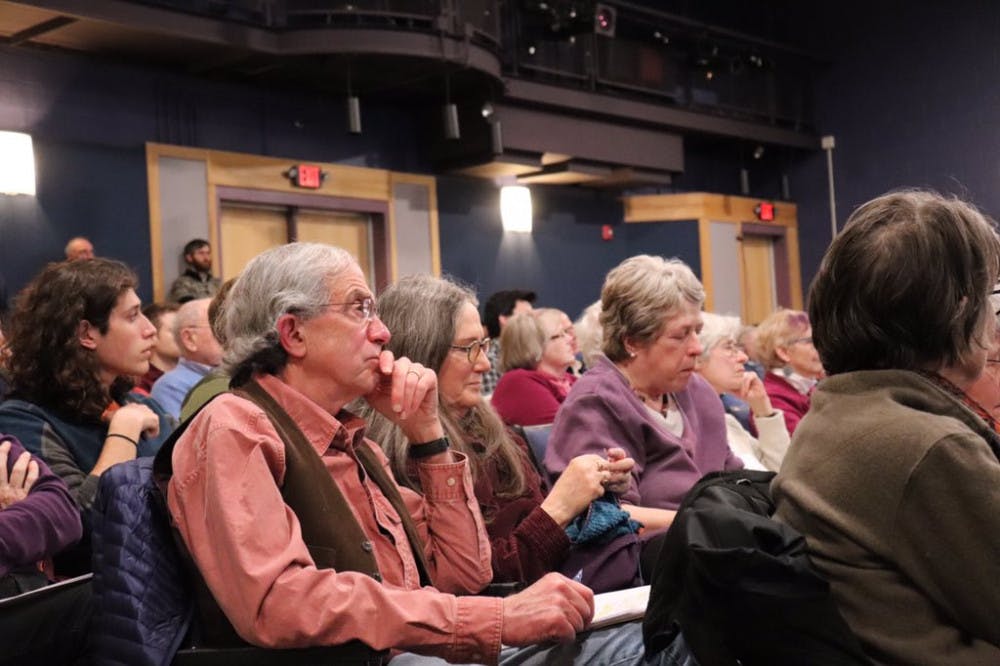The town meeting, a Vermont tradition conceived earlier than the state itself, is fast approaching. Occurring annually in nearly every Vt. town, the meetings provide Vermonters a chance to congregate as a local community to deliberate and vote on budgets, election of town officials and civic issues. Middlebury’s “floor meeting,” or in-person gathering, will be held on Monday, March 2 at 7 p.m. at Middlebury Union High School. The following day — Tuesday, March 3 — Middlebury will host an “Australian ballot,” or paper vote, from 7 a.m. to 7 p.m. at the Recreation Center. The event will coincide with the Vermont presidential primary.
The floor meeting, which gives Vermonters a chance to adopt proposed articles, initiate discussions and propose amendments in person, leaves room for more nuance than a yes-or-no vote like the Australian ballot.
Vermonters have the legal right to take off from work or school to attend, and while only registered voters may deliberate and vote in the Australian ballot, non-voters are welcome to attend as well. This year, the floor meeting will address issues such as the fiscal budget for the upcoming year; water system improvements; and allocation of funds to civic projects, including new police equipment and the maintenance of the Cross Street Bridge.
The Australian ballot, which is cast separately from the floor meeting, will address topics such as the repair of flood walls, maintenance of wastewater treatment facilities and allocation of funds to nonprofits. Nonprofits include the Turning Point Center of Addison County, which works to combat substance abuse, and the Champlain Valley Office of Economic Opportunity, which provides housing, food and fuel security to Vermonters living below the poverty line. The Australian ballot will also allow residents to elect local officials, including the seven members of the Middlebury Selectboard, who chair the annual floor meetings, and town clerk, treasurer and auditor, among others.
Middlebury’s floor meeting was bittersweet last year as former Governor Jim Douglas stepped down from his 33-year stint as moderator. The appreciation for his service was palpable. Selectboard Vice Chair Nick Artim spoke warmly of the retiring moderator and said that Douglas will be missed for “his calm demeanor, his dry sense of humor and his amazing ability to know and remember the names of almost everyone in the audience.” Although the position of moderator is voted on each year, this year’s moderator is expected to be Former Middlebury Selectwoman Susan Shashok, whom Douglas endorsed as a replacement.
Although the tradition of town meetings is considered a mainstay of local Vermont politics, turnout has dwindled in recent years. Many worry that as fewer people attend, more towns will begin opting for Australian ballots only, foregoing floor meetings altogether. In a statement to the Addison Independent last year, Douglas expressed these concerns himself.
“If we have a model and a place where you can learn to be civil and respectful within your own community, that broadens out into the wider culture and informs our national discourse,” he told the paper. “I think we are losing that.”
Although the Australian ballot typically sees higher voter turnout than the floor meetings, each is dependent on factors such as the issues at hand, weather and timing. This year, the Australian ballot falls on Super Tuesday, a day that is host to Vermont’s and many other states’ presidential primaries. The impetus to go to the polls may increase this year’s Australian ballot turnout.
Middlebury’s town meeting is on March 2. What should you expect?

HATTIE LEFAVOUR
The Middlebury “floor meeting” will take place on Monday, March 2, preceding the “Australian ballot” on March 3. Some community members have brought attention to the declining attendance at the annual floor meetings, weighing ballot-voting more heavily than the older form of live deliberation.
The Middlebury “floor meeting” will take place on Monday, March 2, preceding the “Australian ballot” on March 3. Some community members have brought attention to the declining attendance at the annual floor meetings, weighing ballot-voting more heavily than the older form of live deliberation.
Comments



